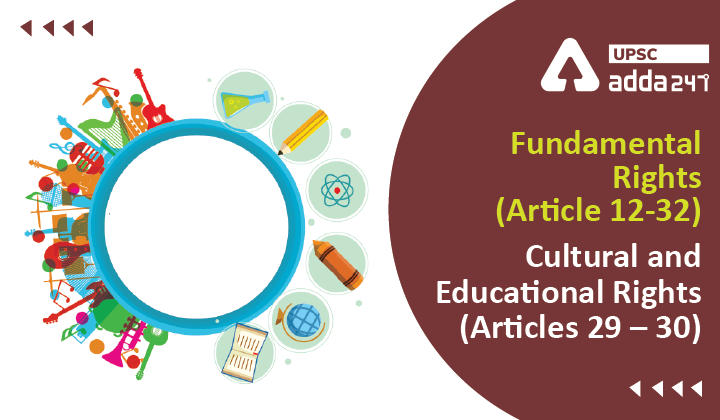Table of Contents
Cultural and Educational Rights (Articles 29 – 30)- Relevance for UPSC Exam
- GS Paper 2: Indian Constitution- Historical underpinnings, evolution, features, amendments, significant provisions and basic structure.
Fundamental Rights (Articles 12-35)- Background
- About: The Fundamentals rights guaranteed under the Constitution of India are fundamental as they have been incorporated into the Fundamental Law of the Land.
- Rights literally mean those freedoms which are essential for personal good as well as the good of the community.
- Fundamental Rights (Articles 12-35) are applied without discrimination on the basis of race, religion, gender, etc.
- Key Mandate of Fundamental Rights: Fundamental Rights are provided in the Indian constitution with an aim to promote the ideals of political democracy in India.
- Source of Fundamental Rights: Fundamental Rights (FRs) of the Indian Constitution derive their origin from the US Constitution (United States Bill of Rights).
Cultural and Educational Rights (Articles 29 – 30)- Key Points
- Need: In a democracy, protection of language, culture and religion of the minorities becomes essential so that the minorities may not feel neglected or undermined under the impact of the majority rule.
- About: Since people take pride in their own culture and language, a special right known as Cultural and Educational Right has been included in the Chapter on Fundamental Rights.
Cultural and Educational Rights (Articles 29 – 30): Key Provisions
- Protection of interests of minorities (Article 29): Any minority group having a distinct language, script or culture of its own shall have the right to conserve the same.
- No citizen shall be denied admission into any educational institution maintained by the State or receiving aid out of State funds on grounds only of religion, race, caste, language or any of them.
- Right of minorities to establish and administer educational institutions (Article 30): All Minorities, whether based on religion or language, have the right to establish and administer educational institutions of their choice.
- In making any law providing for the compulsory acquisition of any property of an educational institution established and administered by a minority, the State shall ensure that the amount fixed by or determined under such law for the acquisition of such property would not restrict or abrogate the right guaranteed under that clause.
- The State shall not, in granting aid to educational institutions, discriminate against any educational institution on the ground that it is under the management of a minority, whether based on religion or language.
Fundamental Rights (Articles 12-35)- Right to Freedom (Article 19-22)
Fundamental Rights (Articles 12-35) | Right to Equality (Article 14-18)
Fundamental Rights (Articles 12-35)- Part III of Indian Constitution: Source, Mandate and Key Features
Fundamental Rights (Article 12-32) | Rights against Exploitation
Fundamental Rights (Article 12-32) | Right to Freedom of Religion (Articles 25-28)





 TSPSC Group 1 Question Paper 2024, Downl...
TSPSC Group 1 Question Paper 2024, Downl...
 TSPSC Group 1 Answer key 2024 Out, Downl...
TSPSC Group 1 Answer key 2024 Out, Downl...
 UPSC Prelims 2024 Question Paper, Downlo...
UPSC Prelims 2024 Question Paper, Downlo...
